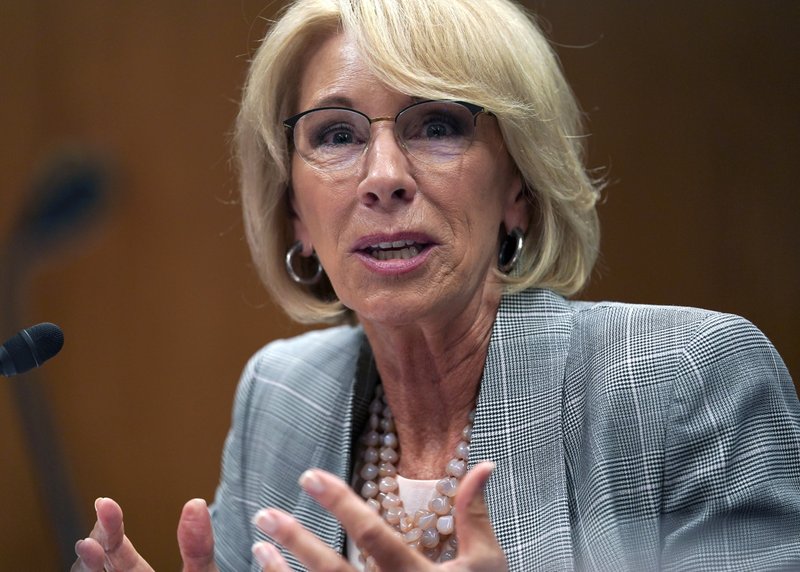WASHINGTON -- A federal court has ruled that it was "arbitrary and capricious" for Education Secretary Betsy DeVos to delay a rule meant to protect students swindled by for-profit colleges. The decision is a significant blow to President Donald Trump administration's attempt to ease regulations for the industry.
A judge in Washington ruled Wednesday in favor of Democratic attorneys general from 19 states and the District of Columbia and former students. They had sued DeVos over her decision last year to postpone the rules finalized under President Barack Obama.
DeVos had argued the Borrower Defense rules created "a muddled process that's unfair to students and schools."
Judge Randolph Moss said DeVos' rationale for freezing the regulation contained a "fundamental and unexplained inconsistency."
Massachusetts Attorney General Maura Healey, who led the lawsuit, said the ruling was "a victory for every family defrauded by a predatory for-profit school."
Toby Merrill, a litigator at Harvard University's Project on Predatory Student Lending, which represents defrauded students, hailed the decision as "a huge rebuke to the department."
"It's a really big deal, it's an incredibly important win for student borrowers and really for anyone who cares about having a government that operates under the rule of law as opposed to as a pawn of industry," Merrill said.
Department spokesman Liz Hill said the agency was reviewing the ruling.
It was not immediately clear what further action the court might take. The judge ordered that both parties appear for a status conference today to "address remedies."
Merrill said she hopes the judge will rule that the delayed rules must now take effect. If that happens, she said, students would win some important protections: not having to sign away their right to sue the school, getting loans automatically discharged if their school was closed mid-program and if they were unable to transfer their credits to a similar program, and being eligible for forbearance when applying for loan discharge.
DeVos' practice of granting only partial loan forgiveness to students defrauded by nonprofits was ordered frozen as a separate suit proceeds. It was uncertain whether Wednesday's court ruling would affect that case, as well.
The Obama administration created the rule in the wake of revelations that some for-profit colleges enticed students with promises of an education and diplomas that would allow them to get jobs in their chosen fields. In reality, many of those certifications weren't recognized by prospective employers, leaving graduates saddled with student loans they couldn't repay.
The Borrower Defense regulations changed the rules for forgiving student loans in cases of school misconduct and required "financially risky institutions" to be prepared to cover government losses in those instances, according to Moss' 57-page ruling.
By postponing the effective date of those regulations, the Education Department deprived students 'of several concrete benefits that they would have otherwise accrued,' Moss said. 'The relief they seek in this action -- immediate implementation of the Borrower Defense regulations -- would restore those benefits.'
The regulations were to take effect on July 1, 2017, but DeVos delayed implementation in June that year after the California Association of Private Postsecondary Schools sued, challenging the validity of the rule.
DeVos said then that while her "first priority" was to protect students, the Obama administration's rule-making effort had "missed an opportunity to get it right." In October, her department provisionally reset the effective date to July 1, 2018, and then, in February postponed it again, now to July 1, 2019.
Moss ruled all those delays were invalid. He rejected a succession of arguments from government lawyers, calling some "unpersuasive," and others "unhelpful." His decision also covered claims by two student-borrowers in a lawsuit filed on their behalf by the consumer advocacy group Public Citizen. The states' suit was later consolidated with it.
Today's hearing will include California Association attorneys.
Information for this article was contributed by Maria Danilova of The Associated Press and by Andrew Harris and Daniel Flatley of Bloomberg News.
Business on 09/14/2018
